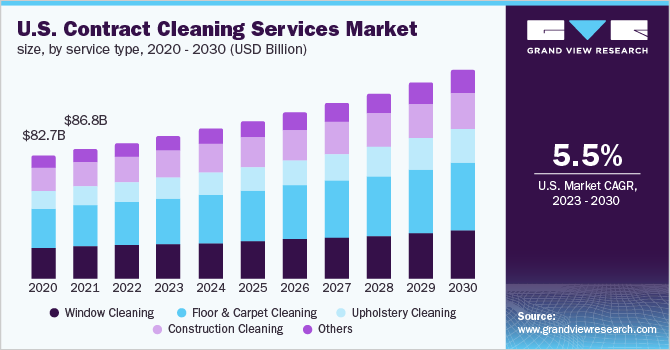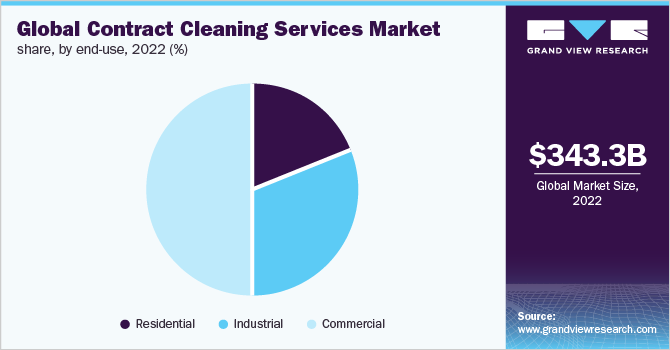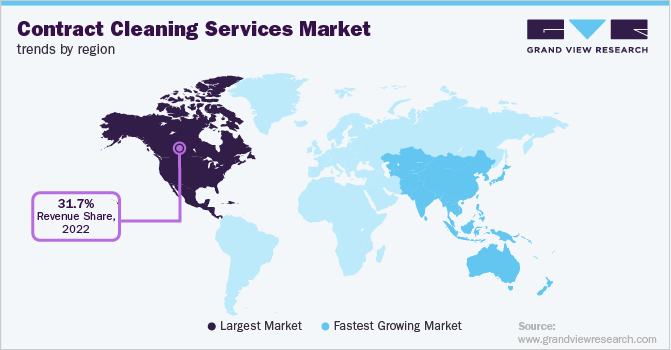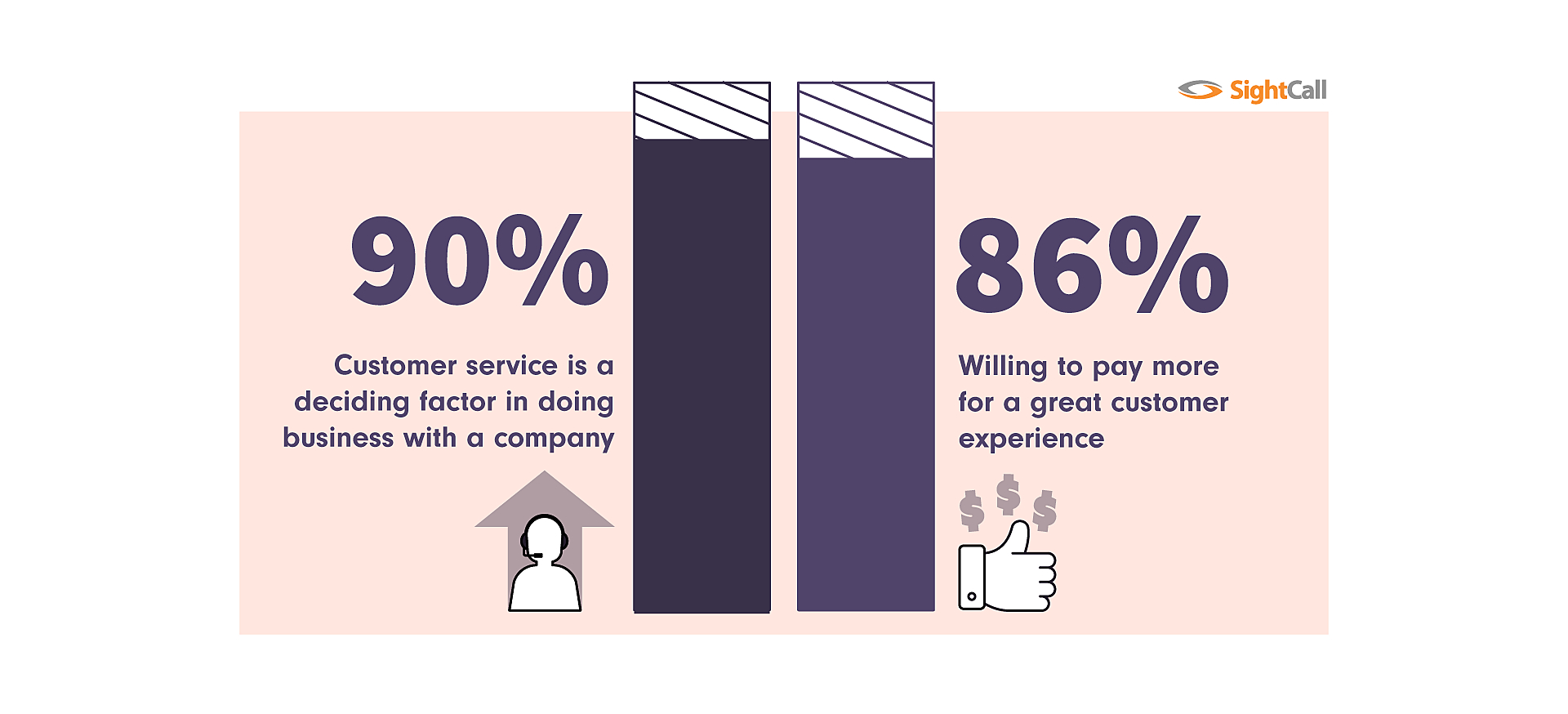Are you looking to start a profitable business in a growing industry? Look no further than the construction cleaning sector! The global contract cleaning market hit $343.34 billion in 2022 and is expected to expand at a compound annual growth rate (CAGR) of 6.3% from 2023 to 2030.

Starting a construction cleaning business offers a unique opportunity to capitalize on this growth while providing a valuable service to contractors and property owners. Imagine the satisfaction of transforming a dusty, debris-filled construction site into a spotless, move-in-ready space.
In this comprehensive guide, we’ll walk you through the essential steps to launch your own successful construction cleaning business. From understanding the market and developing a business plan to securing clients and managing operations, you’ll gain the knowledge and tools needed to start.
1. Conduct Construction Cleaning Market Research
Before diving into the exciting world of starting a construction cleaning business, it’s crucial to conduct thorough market research. This step will help you understand the industry landscape, identify potential opportunities, and make informed decisions as you launch and grow your business.

Some details you’ll learn through market research in a post-construction or house cleaning business include:
- The growth in this industry is driven by factors such as increasing construction activities, rising demand for professional cleaning services, and a growing emphasis on health and safety in the workplace.
- As construction projects continue to rise, the demand for construction cleaning services will follow suit.
- Construction cleaning clients typically include general contractors, subcontractors, property developers, and property management companies.
- Cleaning construction sites means following safety requirements, waste disposal guidelines, and licensing or certification requirements.
- The market also presents challenges like intense competition, seasonality of work, and the need for specialized equipment and trained staff.
By conducting thorough market research, you’ll gain a deep understanding of the construction cleanup business industry. Armed with this knowledge, you’ll be well-positioned to create a compelling business plan and take the necessary steps to turn your entrepreneurial vision into a thriving reality.
2. Analyze the Competition
To succeed in the construction cleanup service industry, it’s essential to thoroughly analyze competing local businesses. Start by identifying the key players in your local market, including both established businesses and new entrants. Research their services, pricing, target customers, and marketing strategies.

When analyzing brick-and-mortar competitors, visit their physical locations (if applicable) to assess their facilities, equipment, and overall professionalism. Take note of their branding, customer service, and any unique selling points they emphasize.
In today’s digital age, it’s crucial to evaluate your competitors’ online presence. Begin by conducting a Google search for construction cleanup services in your area and analyze the top results. Visit your competitors’ websites to assess their design, user experience, and content quality.
Next, examine your competitors’ social media profiles on platforms like Facebook, Instagram, and LinkedIn. Analyze their follower base, engagement rates, and the type of content they share. This will give you insights into their marketing strategies and how they interact with their target audience.
To gain a deeper understanding of your competitors’ online reputation, read customer reviews and testimonials on their websites, social media profiles, and third-party review sites like Yelp and Google My Business.
By conducting a thorough analysis of your competition, both offline and online, you’ll gain valuable insights into the construction cleaning market. Use this information to identify gaps in the market, refine your unique selling proposition, and develop strategies to differentiate your business from the competition.
3. Costs to Start a Construction Cleaning Business
When starting a construction cleaning business, it’s crucial to have a clear understanding of the startup and ongoing costs involved. This will help you plan your finances, secure funding, and make informed decisions as you launch and grow your business.
Startup Costs
- Depending on your location, you may need to register your business with the state and obtain necessary licenses and permits. These costs can range from $100 to $1,000.
- Investing in insurance is critical to protect your business from potential liabilities. General liability insurance for a small construction cleaning business typically costs between $500 and $2,000 annually.
- You’ll need to purchase cleaning equipment and supplies, such as vacuum cleaners, mops, buckets, cleaning solutions, and safety gear. Expect to spend between $2,000 and $10,000 on initial equipment and supplies.
- A reliable vehicle is necessary for transporting your equipment and staff to job sites. Depending on your needs, you can either purchase a used vehicle for around $10,000 to $20,000 or lease one for $300 to $800 per month.
- To attract clients, you’ll need to invest in marketing and advertising efforts. Set aside $1,000 to $5,000 for creating a website, business cards, flyers, and other promotional materials.
Total startup costs can range from $15,000 to $40,000, depending on the scale of your business and your specific requirements.
Ongoing Costs
- Ongoing costs for cleaning supplies, such as cleaning solutions, paper products, and disposable gloves, can range from $500 to $2,000 per month, depending on the size of your business and the number of clients you serve.
- Regular vehicle maintenance and fuel costs are ongoing expenses to consider. Budget around $500 to $1,000 per month for these costs.
- In addition to general liability insurance, you may need to invest in workers’ compensation insurance and commercial auto insurance. These ongoing costs can range from $1,000 to $5,000 annually.
- To maintain a steady flow of clients, you’ll need to continue investing in marketing and advertising efforts. Allocate $500 to $2,000 per month for these ongoing expenses.
- Don’t forget about administrative costs such as bookkeeping, accounting, and legal fees. These costs can range from $500 to $2,000 per month.
Total ongoing costs can range from $5,000 to $15,000 per month, depending on the size of your business and the number of employees you have.
4. Form a Legal Business Entity
Choosing the right legal entity for your construction cleaning business is a crucial decision that can have significant implications for your liability, tax obligations, and growth potential.
Sole Proprietorship
A sole proprietorship is the simplest and most common form of business entity. As a sole proprietor, you are the sole owner of the business, and there is no legal distinction between you and your company. The main advantage of a sole proprietorship is its simplicity and low startup costs.
Partnership
A partnership is a business entity formed by two or more individuals who share ownership and management responsibilities. Partnerships can be either general partnerships, where all partners have equal control and liability, or limited partnerships, where some partners have limited liability and limited control.
Limited Liability Company (LLC)
An LLC is a hybrid business entity that combines the personal liability protection of a corporation with the tax benefits and flexibility of a partnership. As the owner of a construction cleaning LLC, you are not personally liable for the company’s debts and obligations, providing a layer of protection for your assets.
Corporation
A corporation is a separate legal entity owned by shareholders and managed by a board of directors. Corporations offer the strongest level of personal liability protection, as shareholders are not personally responsible for the company’s debts and obligations.
5. Register Your Business For Taxes
An EIN is a unique nine-digit number assigned by the Internal Revenue Service (IRS) to business entities operating in the United States. It serves as a business’s identification number for tax purposes, much like an individual’s Social Security number.
Applying for an EIN is a straightforward process that can be completed online through the IRS website. To get started, visit the IRS EIN application page and click on the “Apply Online Now” button. The online application is available Monday through Friday from 7 a.m. to 10 p.m. Eastern Time.
The application process consists of several steps. First, you’ll need to provide some basic information about your construction cleaning business. Next, you’ll be asked to provide the name and Social Security number of the responsible party, which is typically the business owner or a principal officer.
After completing the application, you will receive your EIN immediately. Be sure to save a copy of the confirmation notice for your records. There is no cost associated with obtaining an EIN, making it a free and essential step in establishing your construction cleaning business.
In addition to obtaining an EIN, it’s crucial to research and understand your state’s sales tax requirements. The rules and regulations surrounding sales tax vary by state, so it’s essential to consult with your state’s tax authority or a qualified tax professional to ensure compliance.
To register for sales tax, visit your state’s tax agency website and follow the instructions for obtaining a seller’s permit or sales tax license. You may need to provide information such as your business name, EIN, and the types of goods or services you sell.
6. Setup Your Accounting
Proper accounting not only helps you make informed business decisions but also ensures compliance with tax laws and regulations, ultimately saving you time, money, and potential legal headaches.
Accounting Software
Investing in accounting software is important to streamline business finances. QuickBooks is an excellent choice for small businesses, offering a user-friendly interface and a wide range of features tailored to your needs. With QuickBooks, you can easily integrate your bank accounts and credit cards.
Hire an Accountant
Working with a professional accountant can provide additional benefits and peace of mind. An accountant can offer a range of services, including bookkeeping, financial statement preparation, tax planning, and compliance. They can also provide valuable insights and advice to help you make informed business decisions.
Open a Business Bank Account
One of the most common pitfalls for small business owners is mixing personal and business finances. It’s essential to maintain a clear separation between your personal and business finances. Opening a dedicated business bank account is a simple and effective way to keep your finances organized and compliant.
Apply for a Bank Account
In addition to a business bank account, consider applying for a business credit card. A business credit card can provide several benefits, including improved cash flow management, expense tracking, and potential rewards or perks.
7. Obtain Licenses and Permits
Before officially opening your doors, it’s crucial to research and understand the specific licenses. Find federal license information through the U.S. Small Business Administration. The SBA also offers a local search tool for state and city requirements.
One of the most important licenses for a construction cleaning business is a general business license. This license is issued by your state or local government and grants you the legal right to operate your business within their jurisdiction.
In addition to a general business license, your construction cleaning business may also need to obtain a professional license or certification. Many states require cleaning professionals to hold a specific license or certification to ensure that they have the necessary knowledge and skills to perform their services.
Another important permit to consider is a zoning permit. Zoning regulations dictate how land can be used in specific areas, and your construction cleaning business may need to comply with these regulations.
If your construction cleaning business involves the use of company vehicles, you’ll also need to obtain the appropriate vehicle permits and registrations. This may include commercial vehicle registration, vehicle inspection permits, and parking permits.
It’s also essential to be aware of any environmental permits that may be required for your construction cleaning business. Depending on the chemicals and cleaning products you use, as well as your waste disposal methods, you may need to obtain permits related to air quality, water discharge, or hazardous waste management.
8. Get Business Insurance
Business insurance is a critical component of risk management, protecting your company from potential financial losses arising from various liabilities and unforeseen events. In the construction cleaning industry, the risks are substantial.
Your employees work on client properties, often using specialized equipment and cleaning products. Without proper insurance coverage, your business could be held liable for any damages, injuries, or legal claims that occur in the course of your work.
Consider these three scenarios where not having business insurance could have devastating consequences for your construction cleaning business:
- Property Damage: While cleaning a client’s newly constructed office space, one of your employees accidentally damages expensive flooring materials.
- Employee Injury: An employee suffers a severe back injury while moving heavy cleaning equipment at a job site.
- Client Lawsuit: A client slips and falls on a wet floor during a cleaning session, sustaining serious injuries. The client sues your business for negligence.
To protect your construction cleaning business from these and other risks, it’s essential to obtain the right types of business insurance. The process of getting insured involves several steps:
- Assess your risks by evaluating the specific risks associated with your construction cleaning business, considering factors such as the size of your company, the services you offer, and the clients you serve.
- Based on your risk assessment, determine the necessary coverage by identifying the types of insurance coverage your business needs.
- Research and compare insurance providers that specialize in coverage for construction cleaning businesses to shop for insurance. Look for providers with experience in your industry, competitive rates, and good customer reviews.
When applying for insurance, gather the required information about your business, including its legal structure, revenue, number of employees, and scope of services. Have this information readily available to streamline the application process.
Request quotes from multiple insurance providers and carefully review the terms, conditions, and exclusions of each policy to obtain quotes and compare policies. Pay attention to coverage limits, deductibles, and premiums to ensure you’re getting the best value for your business.
9. Create an Office Space
Having a dedicated office space can be incredibly beneficial for your construction cleaning business, even if much of your work is conducted on job sites. An office provides a professional environment to handle administrative tasks, store equipment, and supplies, and meet with clients or employees.
Home Office
A home office is a cost-effective option for many small construction cleaning businesses. If you have a spare room or dedicated area in your home, you can create a functional workspace without the added expense of renting a commercial space. A home office is particularly suitable if you have a small team.
Coworking Office
Coworking spaces, such as WeWork, offer a flexible and affordable alternative to traditional office spaces. With a coworking membership, you can access a professional workspace, conference rooms, and amenities like high-speed internet and printing services. This option is ideal if you need a space to work outside of the home.
Retail Office
For construction cleaning businesses that require a dedicated space for storing equipment, supplies, and vehicles, a retail office or small warehouse may be appropriate. A retail office can provide a combination of workspace and storage, allowing you to keep your equipment secure and easily accessible.
10. Source Your Equipment
When starting a construction cleaning business, sourcing the right materials and equipment is crucial for delivering high-quality services and ensuring the safety of your team. The essential equipment for a construction cleaning business typically includes vacuum cleaners, pressure washers, and floor scrubbers.
Buying New
Purchasing new equipment offers the advantage of reliability, warranty protection, and access to the latest technologies. Retailers like Grainger offer a wide selection of cleaning equipment and supplies. Online marketplaces such as Uline also provide affordable equipment.
Buying Used
Acquiring used equipment can be a cost-effective option for budget-conscious entrepreneurs. Online platforms like Facebook Marketplace, eBay, Craigslist, and OfferUp are excellent resources for finding gently used cleaning equipment at discounted prices.
Renting
Renting equipment can be a smart choice for construction cleaning businesses that require specialized or expensive equipment for short-term projects. Companies like United Rentals and Sunbelt Rentals offer a variety of cleaning equipment for rent, including pressure washers, floor scrubbers, and carpet cleaners.
Leasing
For construction cleaning businesses that require a consistent supply of equipment but may not have the capital to purchase outright, leasing can be an attractive option. Equipment leasing companies offer leasing programs for cleaning equipment, allowing you to spread the cost over time.
11. Establish Your Brand Assets
Establishing a strong brand is crucial for any construction cleaning business looking to stand out in a competitive industry. A well-defined brand helps create a memorable and recognizable identity, builds trust with potential clients, and communicates your company’s unique value proposition.
Getting a Business Phone Number
A dedicated business phone number is essential for establishing professionalism and credibility. Ring Central is an excellent choice for a reliable and feature-rich business phone system, offering virtual phone numbers, call forwarding, and voicemail-to-email functionality.
Creating a Logo
A well-designed logo is the cornerstone of your brand identity. It visually represents your company and helps customers recognize and remember your business. Looka is a user-friendly platform that uses artificial intelligence to help you create a professional logo and complementary brand assets.
Creating Business Cards
Business cards are a tangible representation of your brand and a powerful networking tool. They provide a convenient way to share your contact information with potential clients and partners. Vistaprint offers a wide range of customizable business card templates.
Purchasing a Domain Name
Securing a domain name is crucial for establishing your online presence. When choosing a domain name, keep it short, memorable, and relevant to your business. Namecheap is a reliable and affordable domain registrar that offers a user-friendly interface and excellent customer support.
Build a Website
Create your website using a website builder: Platforms like Wix offer intuitive drag-and-drop interfaces and customizable templates. Hire a professional website designer: Hiring a skilled website designer from a platform like Fiverr can save you time and ensure a high-quality, custom-designed website.
12. Join Associations and Groups
Joining local associations and groups is a powerful way to network with others in the construction cleaning industry, gain valuable insights, and grow your business. These connections can provide access to trade secrets, best practices, and potential business opportunities.
Local Associations
Joining local business associations can help you connect with other professionals in your area, including potential clients. Look for associations specific to the construction or cleaning industries, such as the National Association of Home Builders (NAHB) or the International Facility Management Association (IFMA).
Local Meetups
Regularly attending meetups and tradeshows is an excellent way to network with others in the construction cleaning industry and showcase your business. Meetup is a fantastic platform for finding local events related to your industry.
Facebook Groups
Facebook groups can be an invaluable resource for networking and seeking advice from others in the construction cleaning industry. Check out groups like Post Construction Cleaning Group and Post Construction Clean Up to get started.
13. How to Market a Construction Cleaning Business
Marketing is the lifeblood of any business, and a construction cleaning company is no exception. To grow and succeed in this competitive industry, entrepreneurs must develop and execute a comprehensive marketing strategy that effectively reaches their target audience and showcases the unique value their business offers.
Network Marketing
One of the most valuable assets for any new construction cleaning business is the entrepreneur’s network. Leveraging personal connections, such as friends, family, and former colleagues, can help spread the word about the business and generate initial clients.
As the business grows, satisfied customers become crucial for referrals and endorsements. To encourage happy customers to refer more business, consider implementing a referral program that rewards them with discounts or incentives for each new client they bring in.
Digital Marketing
- Develop a strong social media presence on platforms like Facebook, Instagram, and LinkedIn. Share engaging content, such as before-and-after photos of your work, cleaning tips, and behind-the-scenes glimpses of your team in action.
- Invest in search engine optimization (SEO) to improve your website’s visibility in search engine results pages (SERPs). Focus on relevant keywords, such as “construction cleaning services” and your local area, to attract potential customers who are actively searching for your services.
- Run targeted Google Ads campaigns to reach potential customers who are searching for construction cleaning services in your area. Use compelling ad copy and relevant keywords to maximize your click-through rates and conversions.
- Create a YouTube channel featuring helpful cleaning tips, product reviews, and demonstrations of your services. This can help establish your business as an authority in the industry and attract potential customers who are looking for educational content.
- Start a blog on your website that covers topics related to construction cleaning, such as common challenges, best practices, and industry trends. This can help improve your website’s SEO, establish your expertise, and provide valuable information to potential customers.
Traditional Marketing
- Distribute flyers and brochures to local construction companies, contractors, and property management firms. Highlight your services, competitive advantages, and any special promotions or discounts you offer.
- Attend local trade shows and events related to the construction industry. Set up a booth to showcase your services, network with potential clients, and collect leads for follow-up.
- Consider advertising in local newspapers, magazines, or radio stations that cater to your target audience. While these traditional methods may not always provide the best ROI, they can be effective for reaching specific demographics or geographic areas.
- Sponsor local events or sports teams to increase brand visibility and generate goodwill within the community. This can help establish your business as a trusted and engaged member of the local community.
- Invest in vehicle wraps or signage for your company vehicles. This turns your fleet into mobile billboards, promoting your business while you’re on the job or traveling between sites.
While traditional marketing methods can be effective in certain situations, it’s important to note that they often require a larger investment and may not provide the same level of targeting and measurability as digital marketing efforts.
14. Focus on the Customer
Customer service is the foundation of any successful business, and a construction cleaning company is no exception. In an industry where competition is fierce and customer expectations are high, providing exceptional customer service can be the key differentiator that sets your business apart and drives long-term growth.
At its core, excellent customer service is about understanding and meeting the unique needs of each client. In the construction cleaning industry, this means taking the time to listen to your client’s concerns, understanding their specific requirements, and tailoring your services to ensure their complete satisfaction.

Moreover, satisfied customers are your most powerful marketing tool. When you consistently exceed client expectations, they’ll be more likely to recommend your services to their colleagues, friends, and family. In the construction industry, where word-of-mouth referrals are often the primary source of new business.
To foster a culture of exceptional customer service, focus on training your team to prioritize client satisfaction at every touchpoint. This includes maintaining open lines of communication, responding quickly to inquiries or concerns, and always going the extra mile.
In today’s digital age, customer service extends beyond face-to-face interactions. Make sure your business is easy to find and engage with online, whether through a user-friendly website, active social media presence, or responsive customer support channels.
Ultimately, prioritizing customer service is an investment in the long-term success of your construction cleaning business. By consistently delivering exceptional experiences and fostering strong client relationships, you’ll create a loyal customer base.
